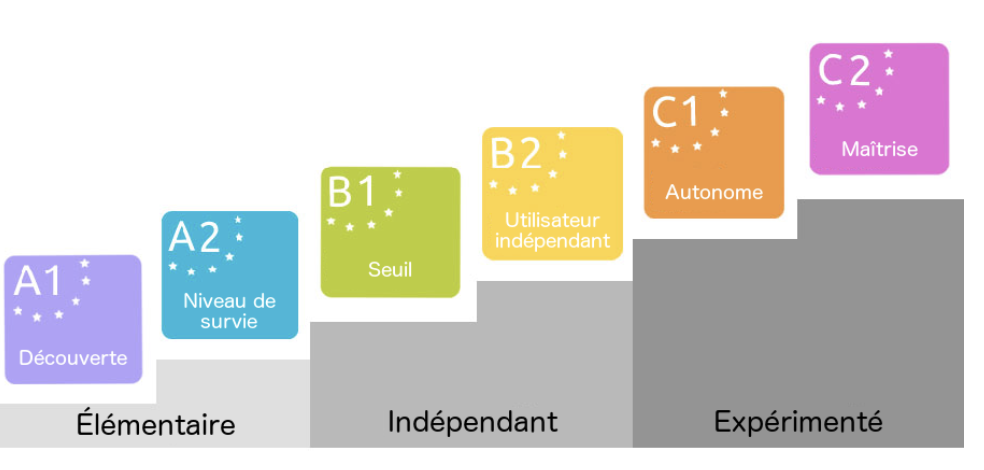Our FLE programs
Our French as a Foreign Language (FLE) training courses are tailored to your needs and projects:
- Preparation for certifications (TCF, DELF or DALF) ;
- Professional procedures (Compte formation [CPF], hiring or promotion);
- Admission to French higher education;
- French naturalization or residence permit;
- Immigration to Canada or Quebec.
Our FLE programs
All our programs are tailored to your project and your needs. We follow the communicative approach and the action-oriented perspective advocated by the Common European Framework of Reference for Languages (CEFR).
Our teaching is based on the use of authentic language and on our students’ success in communicating in line with their objectives.
We work with them to reinforce their knowledge (grammatical and lexical) and skills. We aim for performance in French as a foreign language. All our courses are built around 4 essential components: linguistic reinforcement (oral comprehension, written comprehension, oral expression and written expression), as well as sociolinguistic, sociocultural and pragmatic reinforcement.
We guide all our trainees towards mastery, autonomy and independence.


Methods (manuals and tools)
We use the latest FLE methods from the leading publishers of French as a foreign language.
We use the methods we deem most appropriate for our students’ projects.
What’s more, we offer you unlimited access, for the duration of your training, to our online platforms of complementary interactive resources, indispensable tools for reinforcing your training and improving your performance.
Finally, for certification preparation, one of our specialties, we use interactive online platforms to accompany our individual or small group training courses, enabling you to put yourself in the situation of taking the exam.
The levels
We welcome trainees of all levels, from beginner to advanced, and work with them to determine their objectives and achieve the one they need to succeed in their project:
EXPERIENCED USER | C2 11 12 | Can understand with ease virtually everything heard or read. Can summarise information from different spoken and written sources, reconstructing arguments and accounts in a coherent presentation. Can express him/herself spontaneously, very fluently and precisely, differentiating finer shades of meaning even in more complex situations. |
| C1 9 10 | Can understand a wide range of demanding, longer texts, and grasp implicit meaning. Can express him/herself fluently and spontaneously without much obvious searching for expressions. Can use language flexibly and effectively for social, academic and professional purposes. Can express him/herself on complex subjects in a clear, well-structured way, demonstrating control of the tools of organization, articulation and cohesion of discourse. | |
| INDEPENDENT USER | B2 7 8 | Can understand the main ideas of complex text on both concrete and abstract topics, including technical discussions in his/her field of specialization. Can interact with a degree of fluency and spontaneity that makes regular interaction with native speakers quite possible without strain for either party. Can produce clear, detailed text on a wide range of subjects and explain a viewpoint on a topical issue giving the advantages and disadvantages of various options. |
| B1 5 6 | Can understand the main points of clear standard input on familiar matters regularly encountered in work, school, leisure, etc. Can deal with most situations likely to arise whilst travelling in an area where the language is spoken. Can deal with most situations likely to arise whilst travelling in an area where the language is spoken. Can produce simple connected text on topics which are familiar or of personal interest. Can describe events, experiences and dreams, hopes and ambitions and briefly give reasons and explanations for plans and ideas. | |
| BASIC USER | A2 3 4 | Can understand sentences and frequently used expressions related to areas of most immediate relevance (e.g. very basic personal and family information, shopping, local geography, employment). Can communicate in simple and routine tasks requiring a simple and direct exchange of information on familiar and routine matters. Can describe in simple terms aspects of his/her background, immediate environment and matters in areas of immediate need. |
| A1 1 2 | Can understand and use familiar everyday expressions and very basic phrases aimed at the satisfaction of needs of a concrete type. Can introduce him/herself and others and can ask and answer questions about personal details such as where he/she lives, people he/she knows and things he/she has. – and can answer the same type of questions. Can interact in a simple way provided the other person talks slowly and clearly and is prepared to help. |
Recommended for :
- People looking for an official attestation for administrative procedures at the prefecture in France (residency and naturalization cards);
- People looking for an official attestation for an immigration project in Canada and Quebec;
- People looking for an official attestation for school and university administrative procedures in France.
Benefits
- Speed ;
- Wide variety of dates;
- Easy access.
